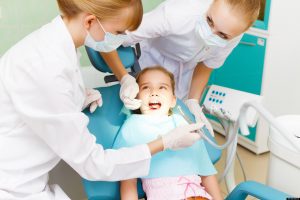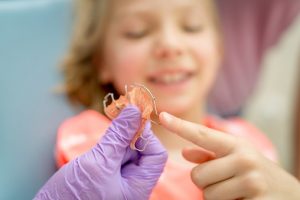We all know the basics of keeping our own teeth healthy, but many people remain relatively clueless when it comes to their children’s oral hygiene. Common questions include things like “when should I make my child’s first dental appointment?”, “should my child be flossing?” and “how do I know if and when my child may need braces?”.
Parenting can be very tough and it can be hard when judging how much dental care your child needs and at what stage in their life. As a parent, you will obviously want to prevent cavities and general tooth decay. However, it is not always clear how to do so for a child.
We have put together a number of points of advice to help you along in your parenting journey.
When should children start to brush their teeth?
 It may be a surprise to you, but good dental care actually starts before a baby’s first tooth surfaces. Just because the teeth have not appeared yet and not visible does not mean they are not there. It is the case that Teeth begin to form in the womb in the second trimmest of pregnancy. At birth, a baby will have 20 primary teeth, many of which are fully developed in the jaw.
It may be a surprise to you, but good dental care actually starts before a baby’s first tooth surfaces. Just because the teeth have not appeared yet and not visible does not mean they are not there. It is the case that Teeth begin to form in the womb in the second trimmest of pregnancy. At birth, a baby will have 20 primary teeth, many of which are fully developed in the jaw.
Even babies can experience tooth decay if good feeding practices are not the norm. Putting a baby to sleep with a bottle may seem like an ideal way to get them to sleep, but this can actually harm the baby’s teeth. Parents and caregivers should set specific times for drinking each day because sucking on a bottle can damage the teeth if done all day.
So how do you care for your baby’s teeth when they are not yet on the surface? And beyond that?
Before your baby starts to teeth, you should run a clean and damp washcloth over the gums in order to rid of any harmful bacteria.
Once your baby starts teething, go out and buy an infant toothbrush to brush their forming teeth. To do this, you should use water and the smallest bit of fluoride toothpaste (measuring about the size of a grain of rice). If you find that you have been using an infant toothpaste which does not contain the fluoride, you will want to minimise any toothpaste that is swallowed.
When your baby has got teeth and they touch, this is when you can begin to floss in-between them.
Once your child is around the age of 2, you should aim to teach them to spit whilst brushing their teeth. Do not teach your child to swish water and spit as this increases the likelihood that they will swallow the toothpaste.
You should always aim to supervise a child younger than 8 while they are brushing their teeth.
When should a child see a dentist?
 It is recommended that a child sees a dentist by their first birthday. This first visit should involve the dentist giving you advice on proper brushing and flossing techniques fit for children of such a young age. He or she will also conduct a modified exam on your child’s mouth whilst they sit on your lap.
It is recommended that a child sees a dentist by their first birthday. This first visit should involve the dentist giving you advice on proper brushing and flossing techniques fit for children of such a young age. He or she will also conduct a modified exam on your child’s mouth whilst they sit on your lap.
These early appointments are important in helping to identify and problems early and help your child get use to visiting the dentist so that they do not build up a fear of doing so in the future.
How can you prevent cavities in kids?
The reason cavities happen is when bacteria and food are left on the teeth after eating and are not brushed away. The Acid collects on the tooth and softens the enamel until a hole, known as a cavity, appears.
To prevent these, you should establish good oral hygiene habits early. Teach your kids to brush their teeth at least twice a day with a fluoride toothpaste and explain that they should floss regularly. Regular exposure to fluoride toughens the enamel, which makes it harder for the acid to penetrate the teeth to create holes.
You should also avoid letting your children have access to certain foods and drinks on a regular basis. On the occasion is fine, but these foods and drinks should not become a habit. These include things like juices, sugary foods, fizzy drinks and sweets. These will begin to erode the enamel and ultimately cause cavities. It is inevitable that you will allow your child to have these on occasion, and when they do, have them rise their mouth or brush their teeth after they have washed away the sugar. This also goes for any sweetened liquid medicines as these can have a similar effect.
As your child ages, the dentist that you visit can help to further prevent tooth decay on a professional level.
What is Orthodontia?
 Older children may find that their bite and the straightness of their teeth can begin to begin them problems. Orthodontic treatment is usually associated with teenagers, but orthodontics has become more advanced and treatment can begin earlier. Children as young as 7 can have corrective appliances to manipulate the teeth at a young age to avoid major treatment later on in life.
Older children may find that their bite and the straightness of their teeth can begin to begin them problems. Orthodontic treatment is usually associated with teenagers, but orthodontics has become more advanced and treatment can begin earlier. Children as young as 7 can have corrective appliances to manipulate the teeth at a young age to avoid major treatment later on in life.
